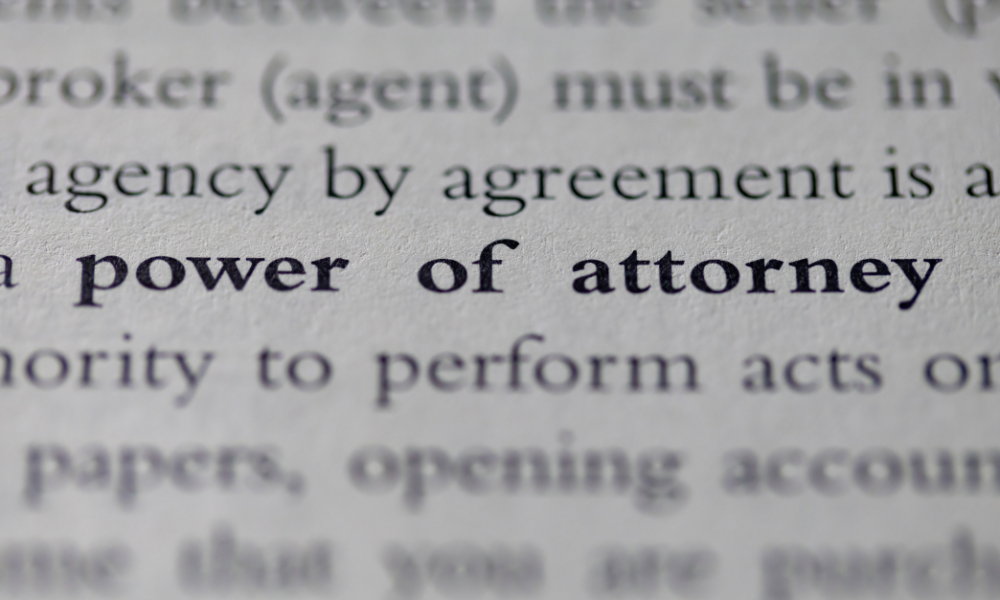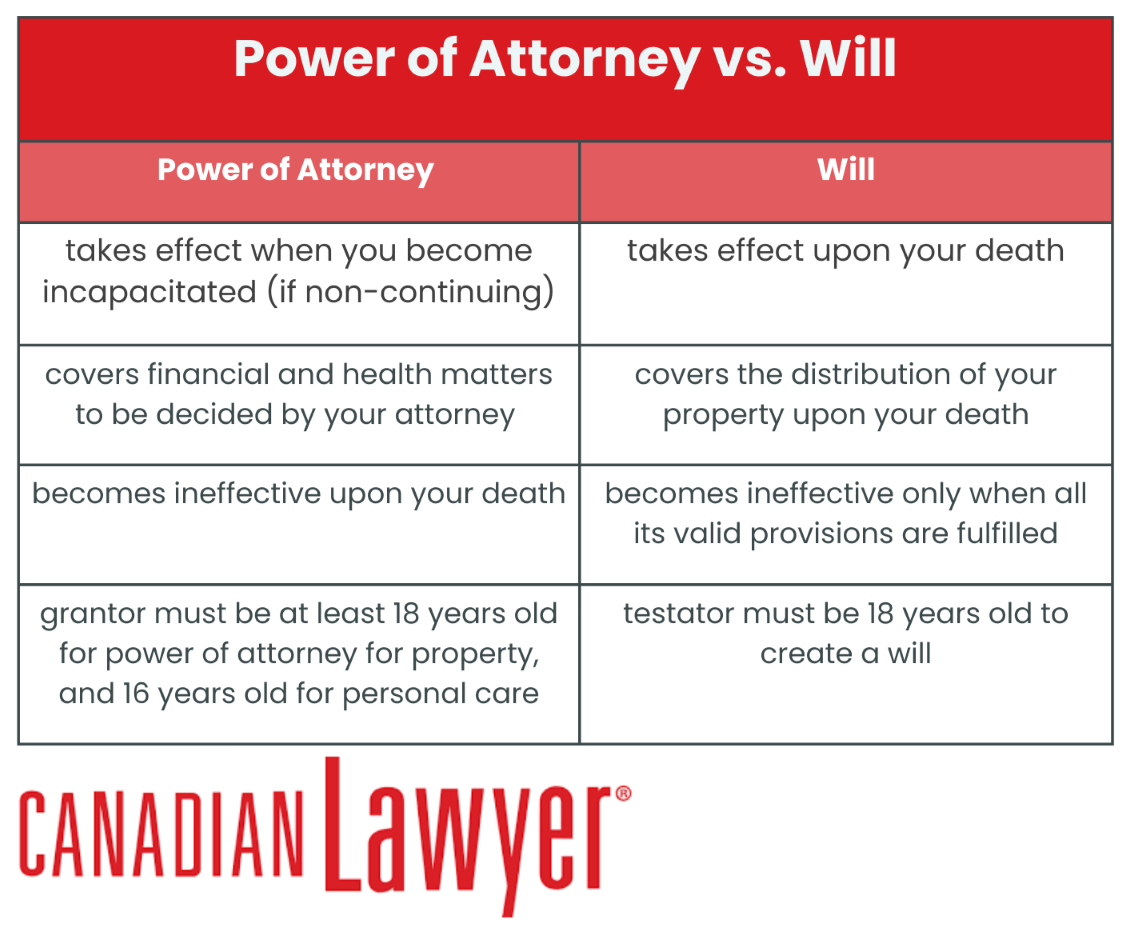
Contrary to what we think, a power of attorney can be made by everyone regardless of one’s age and property. A lawyer may also be needed when creating one

This article on power of attorney first appeared in our sister publication Law Times.
Planning early has always been a good idea, whether it’s for tomorrow’s tasks or for the distant future. The same goes for one’s property and health care decisions, which can be done by executing a power of attorney.
We’ll discuss how this powerful document works and the laws behind it. This article can be used as an education piece by lawyers for their potential clients who want to create one.
A power of attorney is a legal document, where you (called the grantor) authorize a person to make decisions on your behalf when you become incapacitated or mentally incapable. This assigned “attorney” can be any person (or persons, if there’s two of them), who can be a lawyer or not, such as your family members or close friends.
For instance, you were involved in an accident, or you got sick, which made you unable to voice out your preferences — whether it’s a want or a need. In this case, your power of attorney will be used as a basis on how your property will be managed and/or how your medical treatment must go.
Here’s a video from the Ontario government which summarizes the legal side of powers of attorney:
If you need help in creating your own power of attorney, you can consult a law firm that specializes in this practice area. For this, you can check out this Special Report on Best Law Firms for Wills, Trusts, and Estates from Canadian Lawyer Magazine, one of our sister publications.
Whether it’s due to illness, injury, or other circumstances, understanding how powers of attorney work are important to protect your future. It will ensure that you and your family are safe from any unforeseen circumstances in the future. In addition to preparing last wills, this is an important part of your overall trust and estate planning.
Becoming incapacitated and unable to manage your affairs has nothing to do with age, says Suzana Popovic-Montag, the Managing Partner of Hull & Hull LLP. As such, she suggests people assign a power of attorney early. “As soon as you become an adult, you should be preparing a power of attorney and a will because at that point, you’ve got the legal authority and mental capacity to do so.”
This is why it’s a misconception that only the older or rich people should create powers of attorney and/or last wills. Everyone, no matter the age and the size of their estate, must consider creating these legal documents as early as possible. When confused, there’s always a lawyer, such as an estate lawyer, to consult with.
Without a power of attorney for property, a person’s spouse, family or friends cannot manage their financial affairs. The only alternative is a substitute decision-maker, which requires a court order to appoint a guardian, and Popovic-Montag says it can be expensive and time-consuming.
“We always prefer that people get their affairs in order when they’re capable and choose their own substitute decision maker.” She says that if they don’t, someone is going to have to go to court and convince a judge that they’re the best person for the job, and then the court may appoint them. It’s a time consuming and expensive process with no guarantees, she adds.
With this, it’s actually easier to have one in advance, rather than go through the court processes, which are usually lengthy and costly.
Without a power of attorney for personal care, the family of an incapacitated person is limited in making decisions. However, it gives the grantor autonomy over who will be making their healthcare decisions, Popovic-Montag says.
This then gives the family clarity at some point on who is going to make important decisions for the incapacitated grantor. More so, it prevents any potential conflicts from arising between family members, especially if there’s already hostility between them.
While it’s usually interchanged, there are differences between a power of attorney and a last will and testament. These include their purpose, effectivity, and scope of contents. Here's a summary of the key differences:

There are different types of powers of attorney, depending on your situation and your specific needs. The law has also prescribed requirements as to your capacity, your attorney, and some specific standards as to the document’s form for validity, which you must follow as the grantor.
Generally, there are two types of powers of attorney:
Each province may have additional types of powers of attorney or may have different names for these two that are mentioned above.
Another difference between these two kinds is that a power of attorney for property can either be continuing or non-continuing. A continuing one means that the agreement becomes valid the moment it is signed by the grantor, even if the grantor is not incapable. However, Popovic-Montag says a grantor can restrict a power of attorney for property document to become effective only when the grantor is mentally unfit. This makes it a non-continuing.
On the other hand, there must be an incapacity before a substitute decision maker is authorized to act as an attorney for personal care. “You’re putting all of your trust and faith into the hands of someone by appointing them as your substitute decision maker. So, you want to make sure you got the right person and that you have no reservations, because they will have unbounded authority,” Popovic-Montag says.
Powers of attorney are legally binding documents; this is why the law has set up some minimum requirements for it to be valid. This will ensure that what is written in it is really your wishes and demands, and that your attorney is capable and willing for this heavy task.
As to the requirements imposed on you as the grantor, the law provided some standards in measuring your mental capacity at the time of its creation:
mental capacity:
minimum age: you must be at least 18 years of age if it’s for property and at least 16 years of age if it’s for personal care
You can name more than one attorney, but they are presumed to collaborate unless stated otherwise in the document. You may also identify alternate or substitute attorneys in the document, in case the first person you indicated becomes unwilling, unavailable, or incapacitated too.
While it can be created on your own, below is a video that shows why you may need a lawyer when preparing your own power of attorney:
Looking for lawyers to know more about powers of attorney? You can use this directory of the best estate & personal tax planning lawyers in Canada as ranked by Lexpert, another sister publication of ours.
Just like the voluntariness in creating this document, the attorney you appoint is based on your personal choice. They must, of course, be also at least 18 years old, and can be one or two people. Again, the attorney can either be your:
Note that both powers of attorney for personal care and property grant significant control to the attorney. This is why you should trust whoever you assign it to. Popovic-Montag says that more than one attorney can be assigned to ensure increased oversight and accountability, but this creates issues when attorneys disagree on a course of action. She says that powers of attorney can also be abused, especially where there is an oversight on the attorney’s actions.
The contents and forms of powers of attorney are governed by provincial laws instead of federal laws. For instance, for it to be enforceable in Ontario, it’s important that you follow the laws of this province. Other provinces also have different laws as to what may be included and their specific form.
While there is no specific or standard form for powers of attorney, the following are the common requirements both for property and for health care for it to be valid:
For continuing powers of attorney for property, they must be titled as such or should expressly say that you allow your attorney to continue acting for you if you become incapacitated.
Not everyone can be a witness to your power of attorney. The most important restriction to know is that your appointed attorney cannot be one of the witnesses at the same time. Aside from your attorney, there are other specific persons who cannot be a witness, such as your:
These rules apply whether it’s for property (continuing or not) or for personal care.
Some provincial governments provide online forms or mail on request for people to complete their powers of attorney. However, Popovic-Montag says it is advisable to consult with a lawyer in more complex affairs, such as:
Lawyers charge legal fees for the drafting so people can complete the legal document themselves to save costs. However, Popovic-Montag says preparing a power of attorney without a lawyer is not the best choice.
Since appointed attorneys should strictly follow the letter of your power of attorney, every legal limitation must be included in the document. This includes limitations on what decisions they can make and on what specific matters. Not only that this will guide your attorney, but also your family and friends in measuring whether they already exceeded their authority.
If the attorney you assigned engaged in deceitful practices or abuse of power of attorney, there are many legal remedies that you or other persons can pursue:
No matter your age, it’s important to plan by creating a power of attorney. While the process may seem intimidating, the peace of mind it provides for you and your loved ones is invaluable. For this, lawyers in the practice area of wills, trust, and estate can help you draft one or even enforce it in case of problems in the future. What’s crucial is that you’re properly and legally guided when creating this legal document.
Do you have any questions on how to create a power of attorney? Let us know in the comment section below!